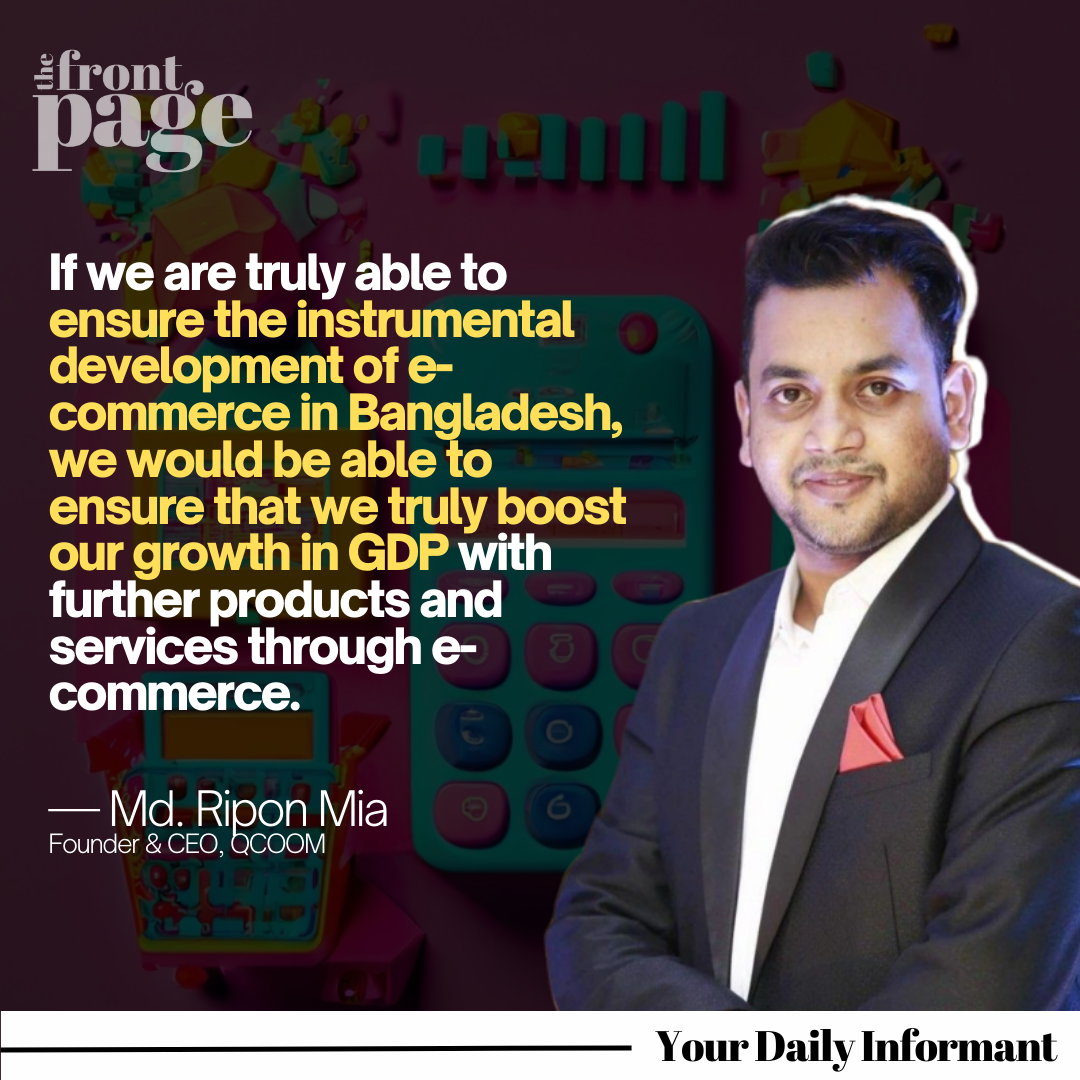
By Md. Ripon Mia, Founder & MD of QCOOM
Bangladesh Startup Summit 2023 was truly a remarkable event in terms of the value it delivered by shedding light on the present-day industries in Bangladesh. Considering the fact that Bangladesh wants to produce 5 unicorns by 2025, e-commerce is set to play a critical role in causing the fruition of such an ambition.
Furthermore, as we transition from a Digital Economy to a Smart Economy by 2041, e-commerce would allow us to tackle one of the key challenges of Bangladesh, which is infrastructure. If utilized effectively, e-commerce holds the potential to transform our existing infrastructure into a more sophisticated and efficient system in our drive to meet SDGs 8, 9, 11, 12 and 13. As per our plan of being a Smart Economy it is imperative to ensure that e-commerce is facilitated to become a significant contributor of GDP and economic growth.
The current market size of the e-commerce industry in Bangladesh is $1.3bn, processes approximately 300,000 orders a day and has investment worth only a mere $2bn per capita which is very insignificant when compared to similar and neighboring nations. It is crucial to realize that our penetration has not increased as well with the most phenomenal burst happening during the time of covid-19.
However, if we focus on the brighter side, e-commerce in Bangladesh exists as being very diverse and inclusive of categories. E-commerce would be a crucial fragment for the Smart Economy. There are multiple dimensions of offerings ranging from travel, food, consumer products and much more. The diversity which exists ensures the sustenance of customers from multiple walks of life as we strive to build a sustainable future to craft value for communities and the nation in general.
In addition, the 4 major components of e-commerce operations in Bangladesh are constantly working in full swing. These 4 components are independent brand platforms, f-commerce, ride sharing and other social media platforms. All of these mediums are responsible for generating vast order quantities, necessitating swift deliveries and are accountable for the satisfaction of large numbers of customers on a day-to-day basis.
While we are transitioning towards being a Smart Economy, there are certain trends in e-commerce which are already in favor. One of these trends is the rise of using MFS in the processing of payments, away from the usage of cards. An impactful objective within Vision 2041 is ensuring total financial inclusion and the creation of a cashless society. The rising number of payments through e-commerce is an example of how we are propelling towards our vision.
Yet, if we truly wish to initiate the next wave of e-commerce in Bangladesh, we need to ensure certain measures and reforms are taken when it comes to devising policies- to transform the ideal pillars to leverage the next wave of e-commerce.
Digital Literacy:
In order to ensure the transition towards a Smart Economy and ensure widespread inclusion in e-commerce, there needs to the instillation of digital literacy amongst everyone. After all, a Smart Economy would call for everyone to have a holistic knowledge of how the digital realm functions.
Include digital education in schools:
The next generation of smart citizens needs to be built from now. However, the focus here is to ensure that digital literacy is not a luxury anymore and instead is transformed into a basic lesson. The incorporation of using AI effectively would also act as a booster. That would ensure that diverse communities – be it rural or urban – are able to navigate through digital platforms, tools and mediums. Essentially, this knowledge would allow them to become native users of e-commerce irrespective of their backgrounds.
Prevent frauds and scams:
Policies and measures need to be formed in ways which allow the monitoring of risk and fraud to protect the interest of consumers at all times. This would mean protection from illogical offers and pyramid schemes. On the other hand, customer-side risks and fraud need to be mitigated as well.
Devise progressive data policies:
Data in Bangladesh tends to be expensive. To ensure the successful operation of e-commerce and inclusion, data needs to become more affordable and accessible. Because only that is when we would be able to propel towards a smart future and ensure that the dream of a trillion-dollar economy is ensured from all ends.
If we are truly able to ensure the instrumental development of e-commerce in Bangladesh, we would be able to ensure that we truly boost our growth in GDP with further products and services through e-commerce; consequently, cause the creation of jobs and deurbanize to gradually decrease economic externalities from our density clutter since goods and services would be widely available, deliverable and sustainable.




